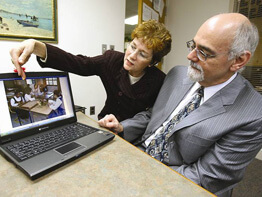Since its founding 45 years ago by the Franciscan Sisters of Baltimore, St. Elizabeth School in Baltimore has developed into one of Maryland’s most respected schools for students with special needs.
The school’s reputation for preparing well-rounded students for the workforce has traveled across the globe, even reaching a new school in Qatar in the Middle East. St. Elizabeth educators were recently invited to visit the school and share ideas for establishing a similar vocational program for Qatari children with special needs.
Dr. Christine Manlove, executive director and principal of St. Elizabeth, and Joshua Gervais, transition coordinator of St. Elizabeth, traveled to the Shafallah Center for Children with Special Needs in Doha, Qatar, Nov. 5-9.
They met with administrators, parents and community leaders, explaining how Baltimore’s program works and suggesting ways it might be adapted for Qatar, a Middle Eastern country occupying a peninsula on the West Coast of the Persian Gulf.
Students at St. Elizabeth are middle and high school youths, ages 11-21, who have cognitive, emotional, learning and/or physical disabilities. In additional to academic courses, students participate in vocational training, with each working at 10 or more off-campus jobs in their years at St. Elizabeth.
Shafallah Center officials were “very excited” about cultivating a similar program, according to Dr. Manlove. But there are significant cultural challenges.
“We know it’s a culture that’s very protective of students with special needs,” said Dr. Manlove, noting that many American families face the same challenge. “It’s a huge leap for parents to let go when they have spent their whole lives taking care of their children.”
For the Qatar program to be a success, Dr. Manlove said parents must recognize that there is dignity in all work, she said, whether it’s working in a restaurant or helping in a hotel.
Several businesses in Qatar have already stepped up to help the vocational program, she said. One has offered the school a kiosk in a public square where students can display and sell pottery, ceramics and weaving. The school itself has also applied some of the vocational approaches discussed by St. Elizabeth officials, starting a recycling program that relies on the students.
“It’s important to give them real work,” she said. “You don’t want to have them sorting colored buttons and then dumping them all back in a box to start over.”
Students with special needs can often learn vocational skills adeptly, according to Mr. Gervais. Their challenge is learning the social skills that must accompany vocational training to make it productive, he said.
The partnership between St. Elizabeth and the Shafallah Center started at the request of Heyam Nassar Meftah, head of special education at the Qatari school. He visited St. Elizabeth in March.


